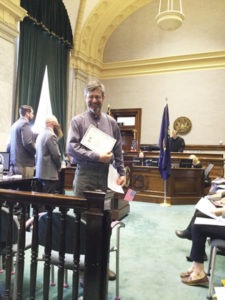
By Russ Lawrence
The number of U.S. citizens living in Ravalli County just went up by a single digit, as long-term farmer/resident Henry Wuensche renounced his German citizenship at a ceremony in Butte on April 26, and swore an oath to become a naturalized citizen.
He celebrated by immediately registering to vote in his first election.
Now the fear of possible deportation has been lifted for Wuensche who, with his wife Laura Garber, are co-proprietors of Homestead Organics, raising organic produce and poultry south of Hamilton.
Wuensche, 49, was born in a small town outside Berlin, in what was at the time East Germany. Following the collapse of the Soviet empire, the destruction of the Berlin Wall, and the sudden reunification of Germany, Wuensche found that Russian as his second language no longer served him well, and he began studying English.
He ended up marrying his American tutor, but they didn’t want to raise their son in the urban environs of Berlin, so in 1997 they returned to her native Bitterroot valley. Wuensche, in his understated manner, described it as “a pretty nice place to grow up.”
His experience as an immigrant went “as smoothly as it could,” he felt.
“I never resisted integration, and I spoke English well enough to get a job,” he explained. He gave full credit to Pioneer Log Homes, which took a chance on someone who wanted to learn a craft, but whose language skills were still uncertain – but rapidly improving.
Work came naturally to him. His father was a farm supervisor, and his mother worked at an agricultural research station, and with their agricultural background they supplemented their income by selling flowers locally. “In East Germany you had to be inventive, but it taught me to be industrious,” he said. Farming and taking care of plants and animals came easily to him.
“In my opinion, I have the perfect job,” he smiled. “I followed what I wanted to do, and the financial part was secondary.”
Following a divorce, Wuensche met Garber, and the two bonded over their love of organic farming. They honeymooned – where else? – in Germany, where Garber had spent her junior year of high school as an exchange student with a U.S. State Department program.
Wuensche lived for 20 years with permanent resident status, which he easily renewed twice, allowing him to remain and work here — but that privilege could have been revoked at any time, for any reason, Garber explained. For years, their lives were full of contingencies. The election of Donald Trump to the presidency created new uncertainties for them, and they decided that now was the time for Wuensche to become a naturalized citizen. Gaining the right to vote was also a factor for Wuensche, so they filed the paperwork on January 3 of this year.
“I didn’t have to make a choice until now,” Wuensche noted, “but it was always there. I didn’t want to take that chance any longer.”
“Now,” Garber observed with relief, “he can be arrested, but he can’t be deported.”
During those 20 years, Wuensche felt an obligation to be a good ambassador for Germany, putting a friendly, approachable face on a nationality that, just under a century ago, was actively shunned in Montana and elsewhere in this country. He never experienced anything like that, in spite of an accent that he never expects to lose. “I can’t avoid being German,” he said of his roots, which he makes no effort to hide.
“In my opinion, it has never hurt anybody to be more open,” he observed.
In exchange for his U.S. citizen status, Wuensche gave up the ability to return to Germany to stay with his aging parents, for any longer than a tourist can stay. His two sisters remained in Germany, and keep him in touch with his family.
At his swearing-in ceremony, 28 new citizens from 20 countries gathered in the Mike Mansfield Federal Courthouse. Wuensche easily fielded a question about Montana’s famous senator, having close ties with the Maureen and Mike Mansfield Center at the University of Montana, which sent the couple to southeast Asia in an exchange program for farmers three years ago.
He characterized the ceremony as “dignified,” with the presentation of the colors by a local Civil Air Patrol unit, and welcoming presentations courtesy of the Veterans of Foreign Wars, the Daughters of the American Revolution, and the Butte Chamber of Commerce. Senators Daines and Tester both had representatives there, as well.
The program for the ceremony included a quote by Thomas Paine, who provided many of the philosophical underpinnings of the American revolution. “Our great title is ‘Americans,’” Paine concluded. That title now includes Henry Wuensche.